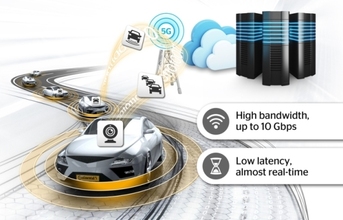
Continental has started a joint research and development collaboration to realize 5G vehicle communications with the Japanese telecommunications company NTT DOCOMO, Inc. to enhance connected infotainment functions and build the foundation for cellular based vehicle-to-everything (V2X) wireless communications systems.
During the concurrent shows Automotive Engineering Exposition 2017 in Yokohama and the Wireless Japan Expo, the two companies demonstrate a prototype application of the emerging 5G mobile communications technology. This oncoming high-performance wireless communication technology is currently being specified and is in its early stages.
It is designed to enable a step-change in the speed of wireless data transmission, transmission quality and speed of response (latency time). NTT DOCOMO is among the world-wide leaders in developing and specifying the 5G standard. Continental takes an active role in defining what is needed to use 5G for future automotive use cases and has already started basic research.
"With 5G we are ahead of the game", said Johann Hiebl, head of Continental's Business Unit Infotainment & Connectivity. "Connecting vehicles is at the top of our agenda but to fully exploit the benefits of the connected vehicle we need the bandwidth, speed and fast response times of tomorrow's cellular networks."
By trying out prototypical applications of 5G Continental gains a deep understanding of practical details and potential fields of further research. "By combining Continental's more than 20 years of automotive connectivity know-how with NTT DOCOMO's leading 5G expertise, we will be ready to reap the benefits of the new technology once it is fully available from around 2022", said Hiebl.
(Continued on the next page)



























